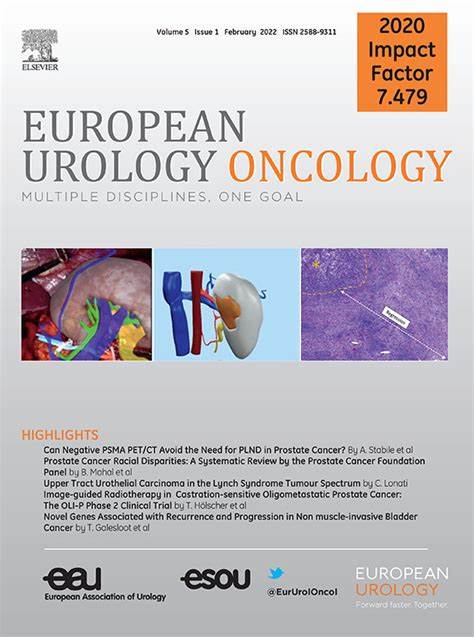虚弱与肾细胞癌:将老年病综合评估纳入共同决策。
IF 8.3
1区 医学
Q1 ONCOLOGY
引用次数: 0
摘要
背景:虚弱是一种老年综合征,其特点是恢复能力和生理储备下降,对老年人的预后和管理有很大影响,尤其是在外科和肿瘤护理方面:概述肾肿块/肾细胞癌(RCC)老年患者管理中的虚弱评估,重点关注其对诊断工作、治疗决策和临床结果的影响:对文献进行了叙述性综述,重点关注虚弱的定义、评估工具及其在老年肿瘤学中的应用,并将其应用于 RCC 领域。对涉及虚弱的预后价值、其对治疗结果的影响以及潜在干预措施的相关研究进行了总结:虚弱是一种不良预后因素,会影响局部和转移性 RCC 的治疗决策。老年病筛查工具 8 (G8) 和 Mini-COG 测试等筛查工具可帮助临床医生选择老年患者(即年龄≥65 岁),由专门的老年病学专家进行进一步的全面老年病学评估 (CGA)。CGA 可为患者的风险分层提供见解,并为后续治疗路径提供指导。因此,要满足体弱患者的复杂需求并优化临床疗效,老年病学专家参与多学科肿瘤委员会的工作就显得尤为重要。在此,我们提出了一个专门的护理路径,作为在 RCC 临床实践和研究中实施虚弱评估的第一步:虚弱已成为影响老年 RCC 患者管理和预后的关键因素。老年病学专家参与诊断和治疗路径是筛查和评估虚弱程度的实用方法,有助于根据患者整体风险分层做出个性化治疗决定:虚弱是指恢复能力和生理储备的下降,它影响着老年肾细胞癌患者的治疗决策和治疗效果,并指导着个性化治疗。在这篇综述中,我们重点讨论了对 65 岁以上疑似肾细胞癌的肾肿块患者进行虚弱筛查的实用策略,以及在患者和肿瘤相关因素之外整合老年医学意见的个性化管理算法。本文章由计算机程序翻译,如有差异,请以英文原文为准。
Frailty and Renal Cell Carcinoma: Integration of Comprehensive Geriatric Assessment into Shared Decision-making
Context
Frailty, a geriatric syndrome characterized by decreased resilience and physiological reserve, impacts the prognosis and management of older adults significantly, particularly in the context of surgical and oncological care.
Objective
To provide an overview of frailty assessment in the management of older patients with a renal mass/renal cell carcinoma (RCC), focusing on its implications for diagnostic workup, treatment decisions, and clinical outcomes.
Evidence acquisition
A narrative review of the literature was conducted, focusing on frailty definitions, assessment tools, and their application in geriatric oncology, applied to the field of RCC. Relevant studies addressing the prognostic value of frailty, its impact on treatment outcomes, and potential interventions were summarized.
Evidence synthesis
Frailty is a poor prognostic factor and can influence decision-making in the management of both localized and metastatic RCC. Screening tools such as the Geriatric Screening Tool 8 (G8) and the Mini-COG test can aid clinicians to select older patients (ie, aged ≥65 yr) for a further comprehensive geriatric assessment (CGA) performed by dedicated geriatricians. The CGA provides insights to risk stratify patients and guide subsequent treatment pathways. As such, the involvement of geriatricians in multidisciplinary tumor boards emerges as an essential priority to address the complex needs of frail patients and optimize clinical outcomes. Herein, we propose a dedicated care pathway as a first key step to implement frailty assessment in clinical practice and research for RCC.
Conclusions
Frailty has emerged as a crucial factor influencing the management and outcomes of older patients with RCC. Involvement of geriatricians in diagnostic and therapeutic pathways represents a pragmatic approach to screen and assess frailty, fostering individualized treatment decisions according to holistic patient risk stratification.
Patient summary
Frailty, a decline in resilience and physiological reserve, influences treatment decisions and outcomes in elderly patients with renal cell carcinoma, guiding personalized care. In this review, we focused on pragmatic strategies to screen patients with a renal mass suspected for renal cell carcinoma, who are older than 65 yr, for frailty and on personalized management algorithms integrating geriatric input beyond patient- and tumor-related factors.
求助全文
通过发布文献求助,成功后即可免费获取论文全文。
去求助
来源期刊

European urology oncology
Multiple-
CiteScore
15.50
自引率
2.40%
发文量
128
审稿时长
20 days
期刊介绍:
Journal Name: European Urology Oncology
Affiliation: Official Journal of the European Association of Urology
Focus:
First official publication of the EAU fully devoted to the study of genitourinary malignancies
Aims to deliver high-quality research
Content:
Includes original articles, opinion piece editorials, and invited reviews
Covers clinical, basic, and translational research
Publication Frequency: Six times a year in electronic format
 求助内容:
求助内容: 应助结果提醒方式:
应助结果提醒方式:


